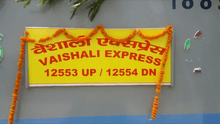Vaishali Express
 | |
| Overview | |
|---|---|
| Service type | Superfast Express Train |
| Status | Operating |
| First service | 1969 [1] |
| Current operator(s) | Indian Railways |
| Route | |
| Start | New Delhi (NDLS) |
| Stops | 19 |
| End | Barauni Junction (BJU) |
| Distance travelled | 1,187 km (738 mi) |
| Service frequency | Daily |
| Train number(s) | 12553 / 12554 [2] |
| On-board services | |
| Class(es) | First AC, AC 2 Tier, AC 3 Tier, Sleeper Class, Unreserved |
| Seating arrangements | Available |
| Sleeping arrangements | Available |
| Catering facilities | Available (Paid) |
| Technical | |
| Track gauge | Broad Gauge |
| Operating speed | 110 km/h (68 mph) (average speed 55 km/h (34 mph)) |
Vaishali Express is a daily superfast train service, connecting Barauni in East Central India to New Delhi. This train is one of the oldest train of this route. Earlier it was known as Jayanti jayanta express. It is the first train after Bhopal Express to be certified for quality at the ISO 9000 level. It connects the major cities of Bihar and UP like Muzaffarpur, Chhapra, Siwan, Deoria, Gorakhpur, Kanpur, Lucknow, Gonda & Basti with the national capital New Delhi. The aged ICF coaches of the train were replaced with LHB coaches during first week of May 2018, increasing its speed limit to 130–150 kilometres per hour (81–93 mph).
Coaches and facilities
The train usually runs with 24 coaches viz., ENG-SLR-GS1-GS2-S1 TO S10-PC-B1-B2-A1-A2-HA1-H1-GS3-GS4-GS5-SLR. The 12553 Barauni-New Delhi Vaishali Express Train will be augmented on a permanent basis by one additional sleeper coach from 04-09-11 when departing from Barauni.
Rake Composition
- 1 Hydrid AC I + AC II
- 1 AC I Tier
- 1 AC I Tier
- 2 AC II Tier
- 2 AC III Tier
- 10 Sleeper Coaches
- 6 General
- 2 Second-class Luggage/parcel van
| Loco | 1 | 2 | 3 | 4 | 5 | 6 | 7 | 8 | 9 | 10 | 11 | 12 | 13 | 14 | 15 | 16 | 17 | 18 | 19 | 20 | 21 | 22 | 23 | 24 |
|---|---|---|---|---|---|---|---|---|---|---|---|---|---|---|---|---|---|---|---|---|---|---|---|---|
| GRD | GEN | GEN | S1 | S2 | S3 | S4 | S5 | S6 | S7 | S8 | S9 | S10 | PC | B1 | B2 | A1 | A2 | H1 | HA1 | GEN | GEN | GEN | GRD |
Award
Vaishali Express was awarded ISO 9000 on 1 May 2012.
References
- ↑ "Railway Budget speech 1970-71" (PDF). www.indianrailways.gov.in. Government of India, Ministry of Railways. 23 February 1970.
- ↑ "Train timings". Retrieved 2007-04-05.